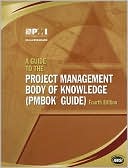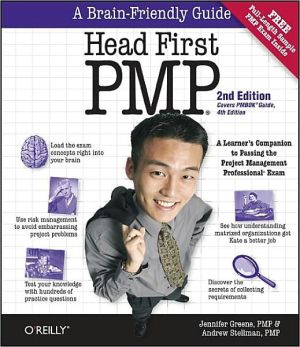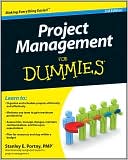Project Management
This reader-friendly series is a must read for all levels of managers\ All managers, whether brand-new to their positions or well established in the corporate hierarchy, can use a little brushing-up now and then. The skills-based Briefcase Books Series is filled with ideas and strategies to help managers become more capable, efficient, effective, and valuable to their corporations.\ Project Management reviews the steps in organizing and managing projects, from how to build a realistic...
Search in google:
Project Management You've been given a project to manage—now what? Project Management provides you with twenty-four lessons detailing the fundamental skills of successful project management. From understanding the project manager's role to working within budgets and leading a team to understanding and becoming comfortable with the basic tools of project analysis, this latest addition to the popular McGraw-Hill Professional Education Series will show you how to:Motivate your team • Develop a configuration plan • Perform financial analyses • Quantify and analyze risks • Manage communication channels • Maximize learning • Document goals and achievements • Perform a successful and seamless hand-off Effective project management isn't easy. The payoff, however, is huge, both for your organization and your career. Project Management will give you the essential foundation knowledge you need to become a high-performing, well-regarded, and—in all likelihood—well-rewarded project manager.Gary Heerkens is president of Management Solutions Group, a provider of project management educational solutions and organizational support.
Congratulations ... You're the Project Manager!\ Brad picks up the phone before the second ring. It's his boss, Susan. "Brad, I'd like you to stop by my office right after lunch today."\ Brad is not really sure why the boss is calling him into her office, which makes for a long lunch hour. He knows he's been doing a good job lately. As a matter of fact, he knows that he's probably the most technically capable person in the group.\ Brad's mind begins to race…. Maybe it's an award? Could it be a promotion?\ "No, wait," he says to himself in a frenzy of self-doubt. "Maybe I did something I wasn't supposed to? Or maybe I didn't do something I should have?"\ Countless positive and negative scenarios run through Brad's overworked mind until one o'clock finally rolls around and he cautiously enters Susan's office.\ "Brad, I've got some great news for you," Susan begins. "Since it's so closely related to what we do here, Project Apex has been assigned to our group." Brad smiles without knowing why.\ Susan continues, "You're one of the best engineers I have." Brad's smile widens in anticipation. And then-without warning-Susan utters those fateful words. "Congratulations, Brad, I'm assigning you as the project manager for Project Apex."\ Great news? Did she say great news? "What do I know about managing projects?" Brad thinks to himself.\ As Brad begins to leave Susan's office, she delivers the knockout punch. "By the way, Brad," Susan says with a curious inflection in her voice, "I think you should be aware ... management is really going to be watching closely. There's an awful lot resting on the success of your project."\ As Brad slips out of Susan's office, the same two words keep ringing in his ears-"your project."\ The Accidental Project Manager\ The story above is not an isolated incident. Every day, engineers, salespeople, technicians, and countless others are thrust into the role of project manager. They're very good at what they do. In fact, they're typically the most technically knowledgeable engineers or the most successful salespeople. Now they're about to become project managers. \ Actually it's probably appropriate to refer to them by their more popular (however informal) name-accidental project managers. An accidental project manager is a person who is placed into the role by organizational necessity and chance, rather than by design or through choice of career path.\ If you're an accidental project manager, one of the first things you should do is pause to consider whether or not you're cut out to be a project manager and try to determine whether it's what you really want to do. Why? Because if you do a reasonably good job leading your first project, chances are you'll be asked again. And again. And again. In other words, if you're finding yourself in the same position as Brad, you might be embarking upon a new career. You'd be wise to consider some of the pros and cons before saying yes to that career move.\ The information, tools, and techniques presented in this book will move you well along in understanding the mechanics of managing projects. But it's important that you enter this new world with your eyes wide open. With that thought in mind, let's take a closer look at what you might expect to experience as a project manager.\ What Can You Expect to Encounter "Out There"?\ Although you won't often see it addressed in project management reference books, the reality is that mental preparedness may prove to be just as critical to your ultimate success as a project manager as your knowledge base or skill set. And gaining a sound understanding of what's involved in this new role is a critical step toward being mentally prepared. So let's explore those pros and cons in a bit more detail by describing the life of a typical project manager-assuming there is such a thing.\ However Brad may feel about taking on his first project, the truth is that life as a project manager can be extremely rewarding. You'll find it to be different from most any other thing you've ever done. It's complex, varied, and interesting. If done well, it can lead to a very strong sense of accomplishment. These are among the aspects that project managers identify as the main draws to the job.\ At the same time, however, being a project manager will test you in ways you may not be able to imagine now. You will become a focal point in the organization. Everyone will look to you for the answers, but you must be careful not to try to provide all the answers; after all, that's why you have a team.\ And speaking of the team, one of the biggest shifts in behavior (and thinking) you'll encounter will be the need to rely upon others to get things done. In most cases, that's your team. You'll quickly discover that there's far too much for you to do alone, yet delegation will prove to be a challenge for you. Empowering others, and then trusting them to follow through, may be a bit unsettling. You'll find yourself uncomfortable with the idea that others are doing things for which you will be held responsible.\ You'll have lots of responsibility, but you'll be missing the authority often perceived as being required to discharge that responsibility. You'll have to get things done through the people on your team without having any direct control over them. Among your most valued tools will be the ability to persuade and influence, as you seek to form a group of diverse personalities into a unified team with commonalty of purpose.\ Unfortunately, not everyone on your team will be as knowledgeable and skilled as you would like. Nonetheless, you've got to get the job done using whatever resources have been provided. Project management lore is full of tales of project managers who were able to take "the hand that was dealt" and turn it into project success. For you to succeed, you'll have to rely on your ability to coach, mentor, and motivate in order to get the level of performance you need from those assigned to work on your project.\ What will you have to know as a project manager? Well, you'll have to know a little bit about just about everything. You'll have to learn to pay attention to the details, but not get wrapped up in them. You'll have to make countless decisions with insufficient information and despite conflicting signals. You'll have to condition yourself to seek acceptable solutions, rather than perfect ones. You'll have to blend technical expertise with a keen sense of human nature. You'll have to handle administrative matters.\ And while you're busy doing your own thing, you'll have to cultivate and maintain a smooth working relationship with many other people, both inside and outside your organization. Unfortunately, as you seek to carry out the objectives of the project, it's unlikely that everyone you encounter will be an ally. Organizational politics and reality dictate that not everyone will like project management or project managers (that's you!). Many people will admire your role, respect your position, and appreciate your involvement; others will not. You will need to figure out who's who-real fast.\ But at the end of the project, you'll be able to look back and feel a deep sense of pride that comes with producing a successful outcome and creating positive change. Project leadership requires the use of many different skill sets. It involves tasks of limitless variety. You must live by a curious combination of process compliance and individual judgment, of gut feelings and data, of people and things. The challenge is enormous.\ So if you feel mentally prepared to accept this challenge, you're well on your way to becoming a successful project manager. The only thing left is to learn how to do it the right way.\ Throughout this book, we'll tell you and show you how to do project management the right way. And although we'll focus primarily upon the process, we'll never lose sight of the importance of the interpersonal aspects as well as the environmental aspects-the people and things that surround your project. Together, the process and the people form the art and science of project management.\ About the Art and Science of Project Management\ Project management has two major aspects: \ \ the art-leading the people on the project\ the science-defining and coordinating the work to be done\ \ The art of project management relates to the fact that projects are really about people getting things done. Project management requires a keen knowledge of human behavior and the ability to skillfully apply appropriate interpersonal skills. \ The second aspect-and the focus of this book-involves the knowledge, understanding, and skillful application of a prescribed project management process. This process is intended to guide project managers and project teams in effectively performing key process steps, such as identifying the true need, defining the project objective, creating an execution schedule, and maintaining control throughout the entire project. The basic premise of the process is the development of a set of graphic tools, documents, and techniques, all aimed at facilitating project success. Among the graphic tools and documents are the Requirements Document, the Work Breakdown Structure, and the Network Diagram (all covered in chapters to come). Among the many techniques we'll cover will be calculating Net Present Value, preparing a comprehensive proposal, and conducting a Make vs. Buy Analysis.\ About This Book\ As we focus on the tools and techniques of project management throughout this book, we'll be making a few key assumptions intended to represent the most common conditions for practicing project managers today. First, we'll assume that you are the person leading the project-irrespective of your position within the organizational hierarchy. Second, we'll assume that you are managing projects within a matrix environment. This means that the project requires the efforts of individuals from a number of functional departments, such as Marketing, Engineering, Human Resources, Operations, etc. Finally, we'll assume that you do not have direct control over these people; in other words, you are not their immediate supervisor.\ However, even if you're not a practicing project manager, if you're a manager of project managers or an executive, this book will be of great value to you. It will provide you with a wealth of knowledge and insight relative to the life of a project manager. This knowledge and insight will greatly help you develop a meaningful support structure for the project managers and project teams within your organization. Few would deny that project managers stand a much better chance of effectively applying the tools and techniques covered in this book and therefore succeeding with their projects when they operate within a supportive organizational environment. And if you're a supervisory manager or organizational executive, you play a primary role in ensuring that a supportive environment is provided for project managers-like Brad.\ Project Manager's Checklist for Chapter 1\ \ Project management is both an art and a science. The art is strongly tied to the interpersonal aspects-the business of leading people. The science (which this book will focus on) includes understanding of processes, tools and techniques.\ All project managers are expected to be very well versed in the science of project management. You cannot survive without being knowledgeable in this area.\ If you're an accidental project manager (put into the role rather than choosing it voluntarily), you'd better pause to think about whether you're cut out to be a project manager before getting too involved. Although it can be personally satisfying, it's a tough job that requires a thick skin. If you do a good job, you'll probably be asked to lead many more projects, so you'd better be OK with the role, or your life will not be much fun\ Generally speaking, the project manager's job is not intellectually challenging, but it is complex and broad. It requires a large variety of different skills-many of which will be new to you....\
The science and art of project managementUnderstand the PM's role1Build a solid team3Understand the true need5Perform a financial analysis7Conduct a formal kickoff9Pause for "reality checks"11Terminate unworthy projects13Develop a logical plan15Leave room for learning17Understand team dynamics19Develop a configuration plan21Manage all project stakeholders23Measure against a baseline25Be objective about threats27Actively manage communication channels29Optimize project excellence31Consider post-project issues33Manage interfaces35Practice self-management37Recognize multiple success metrics39Use documentation wisely41Reward excellent team behaviors43Maximize learning from closure45Transfer your "lessons learned"47




![Microsoft Office Project 2007 Step by Step [With CDROM] Microsoft Office Project 2007 Step by Step [With CDROM]](/application/data/covers/30/57/9780735623057.jpg)



